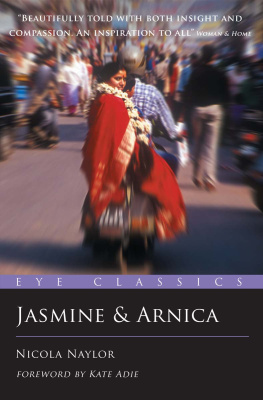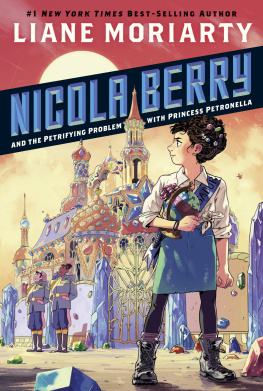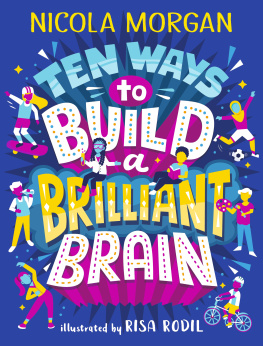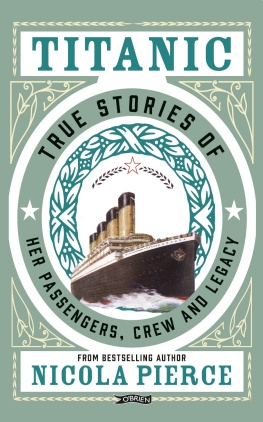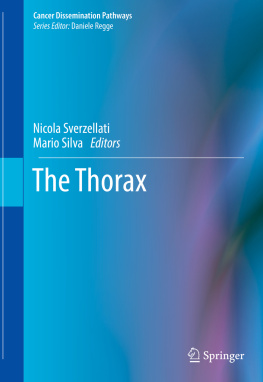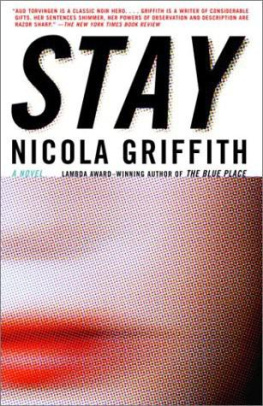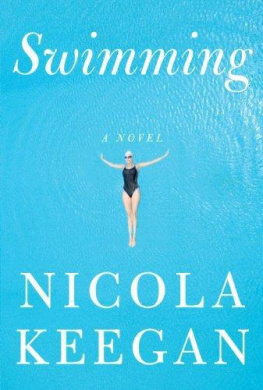P RAISE F OR J ASMINE & A RNICA
This is an account of one blind womans journey around the Indian subcontinent in search of a deeper understanding of aromatic oils. Nicola Naylor displays endless tenacity and courage to triumph over the limitations of her disability. It is a humbling insight matched by a painfully honest display of frustration and selfknowledge as Naylor tries to accept the boundaries within her life. She shares an appreciation of life which most travellers cannot see to enjoy. She allows us to experience pungent wafts of jasmine that creep up our noses, piercing wails of music that whistle in our ears and crisp saris that rustle under our fingertips. Her third eye describes in detail a brightly coloured reel of people and places, images that dart vividly around in our minds eye. Jasmine & Arnica is inspiring. Geographical Magazine
I can only recommend that you read and discover that there are many ways to travel and to see.
Kate Adie
Beautifully told with both insight and compassion, this remarkable story of one womans triumph over adversity will be an inspiration to all its readers.
Woman & Home
Inspiring story
The Daily Mail

This Eye Classics edition first published in Great Britain in 2010, by:
Eye Books
7 Peacock Yard
Iliffe Street
London
SE17 3LH
www.eye-books.com
First published in Great Britain in 2001
Copyright Nicola Naylor
Cover design by Emily Atkins/Jim Shannon
Text layout by Helen Steer
The moral right of the Author to be identified as the author of the work has been asserted.
All rights reserved. No part of this publication may be reproduced, stored in a retrieval system or transmitted in any form or by any means without the prior written permission of the publisher nor be otherwise circulated in any form of binding or cover other than that in which it is published and without a similar condition being imposed on the subsequent purchaser.
British Library Cataloguing in Publication Data
A catalogue record for this book is available from the British Library
ISBN: 978-1-903070-76-5
To Philip Tata and Yvette Parker,
without whom I may not have given life a chance.
C ONTENTS
F OREWORD
S o many of us travel without really looking. Taking the famous sights for granted, and day-dreaming or dozing or chatting while the countryside flashes by. Sometimes a scent lingers, or a sound pricks up the ears, but much disappears into a blurred memory. And the very business of travelling, the tickets, unreliable timetables, rapacious taxi-drivers and the question of whether queuing is regarded a quaint foreign custom, have all to be taken in ones stride.
So, consider travelling in India for many months, with all these usual elements unseen.
Nicola Naylor has a rare insight into these matters, which was not chosen. Her formidable determination to travel and to participate and to notice and observe is a tour de force. And her unsparing analysis of her own behaviour when confronted with both the awkward details and the wider implications of travelling mostly alone is a remarkable example of self-knowledge.
I write as someone whos got lost, been baffled by language, mislaid luggage, taken the wrong bus, got off trains at the wrong stop, been accosted by numerous dodgy strangers, forgotten my hotel room number, collided with rickshaws and bicycling vegetable vendors, taken a taxi-ride during which two of the wheels came off, and certainly wouldnt dream of eating anything, never mind foreign, without taking a very good look at it so Nicolas Jasmine & Arnica strikes me as an object lesson in courage, yet without any self-pity.
And India comes alive as well in descriptions that challenge all the usual notions of what someone who has lost their sight might be expected (by the rest of us) to experience.
I cannot imagine putting myself into the situations, on a daily basis, that Nicola deals with. And I can only recommend that you read and discover that there are many ways to travel and to see.
Kate Adie
Spring 2001
M AP OF S OUTH I NDIA

The process of renaming some towns and cities started after the end of the British imperial period in 1947. Today, for example, Bombay is known as Mumbai, Madras is now Chennai, and Kolkata replaces Calcutta. However, the place names used on the map above and throughout the book were in general use at the time of writing.
P ROLOGUE
W hen I reread my book now as a woman in my forties, I meet my younger selves. But it is not always that I am transported to India and that my encounter is with the woman in her thirties embarking on a life-changing journey of discovery. Sometimes I travel ten years further back in time to a South London psychiatric hospital and find an angry, broken young woman who had lost her sight and her mind. One reunion is energising, the other is still harrowing, but somehow I have reconciled them with who I am today.
If I linger in my own bleak company, on that hospital ward, I quickly recall the dark and the despair descending to deaden my soul. I saw no future and wanted to end my life. Yet, I have lived another twenty five years and journeyed to places I never imagined I would know. I so nearly cancelled my ticket and my life and I am ever grateful that I didnt. I still wonder why I didnt. I made my raft and chose to set sail again but part of me will always trawl the depths for the drowned, the stranded. I cannot forget that I nearly was one.
My mothers depression led her to suicide. I was just fifteen and while she spent time convincing herself that there was no other way, she convinced me too. This was a very hard lesson to unlearn when my life was wrecked by blindness. I now value the extraordinary ability we have to survive, to make changes and to go places all the more because I spent so long only seeing solutions in exit signs.
As much as I wanted to share my personal journey in Jasmine & Arnica I did not want to make an arrogant or a trite triumph over tragedy story out of it. These are too often poorly disguised parables, or instruction manuals, cheerleading about how to face fear or conquer depression. I dont believe that there are formulaic solutions to surviving lifes crashes and to suggest that there are can be cruel. Some years ago I watched my step mother in her final weeks of life, ravaged by cancer. She was a strong, determined middle-aged woman with everything to live for. She tried to visualise her cancer into submission. I watched while she clung to a healer, pleading her faith and belief that she could win. She added failure to her final despair because somehow she couldnt follow the instructions in all those self-help books she had been reading. Travel books are not guide books. Mine is but one perspective.
Ordinary people, all of us, can do extraordinary things but not always. All our stories are individual and personal as are the inner and outer journeys that we make. That is what makes them refreshing and engaging. I hope that my story offers enough flavour to whet the appetite but leaves people to discover their own recipes. When I was in the early years of coming to terms with having lost my sight, I know I would have chosen to starve rather than to digest other peoples survival triumphs and their ways of overcoming disability.

